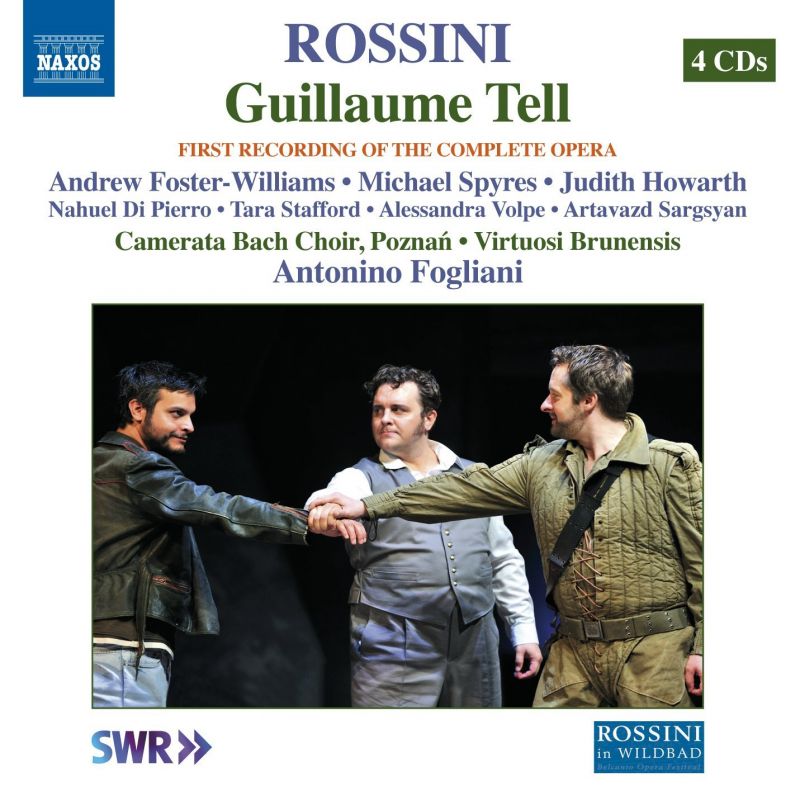ROSSINI William Tell
View record and artist detailsRecord and Artist Details
Composer or Director: Gioachino Rossini
Genre:
Opera
Label: Naxos
Magazine Review Date: 06/2015
Media Format: CD or Download
Media Runtime: 252
Mastering:
DDD
Catalogue Number: 8 660363/66

Tracks:
| Composition | Artist Credit |
|---|---|
| Guillaume Tell |
Gioachino Rossini, Composer
Alessandra Volpe, Hedwige, Mezzo soprano Andrew Foster-Williams, William Tell, Baritone Antonino Fogliani, Conductor Artavazd Sargsyan, Ruodi, Tenor Camerata Bach Choir, Poznan Gioachino Rossini, Composer Giulio Pelligra, Rodolphe, Tenor Judith Howarth, Mathilde, Soprano Marco Filippo Romano, Leuthold, Bass Michael Spyres, Melcthal, Tenor Nahuel Di Pierro, Walter Furst, Bass Raffaele Facciola, Gesler, Bass Tara Stafford, Jemmy, Soprano Virtuosi Brunensis |
Author: Richard Osborne
Naxos declares this to be the ‘first recording of the complete opera’. Given that there is no single identifiable ‘complete’ version of the opera, this is at best a half-truth. The still superb 1972 Gardelli recording is, to all intents and purposes, complete. Indeed, it is more than complete. Using the officially sanctioned Troupenas Edition which was published to coincide with the work’s premiere at the Paris Opéra in August 1829, Gardelli includes music that was cut (mainly for reasons of length) during the final weeks of rehearsal while the score was being printed.
Drawing on the 1992 Critical Edition and its appendices, the Wildbad production also conjures up a ‘pre-premiere’ text. Indeed, it goes one better by including the aria Rossini originally gave to Tell’s son Jemmy before the arrow-shooting. Gardelli has this as an appendix, in a brittle, not to say flashy performance by Mady Mesplé. In Wildbad it is part of the unfolding drama, sung with sympathy and style by the gifted young American soprano leggiero Tara Stafford. (Verdi’s Oscar surely awaits.)
Naxos’s own extensive addenda include a number of ballet music variants and, intriguingly, the finale of the three-act reduction which the Paris Opéra staged in 1831. This ends not with the great sunrise hymn to liberty but with a choral version of the overture’s famous pas redoublé. To get the effect (it’s pretty dreadful) you need to segue from the end of Act 3 to the final track of disc 4.
Andrew Foster-Williams’s Tell was described by one British opera magazine as ‘angry and ungainly’. On the evidence of this recording, he is neither. Gardelli’s Gabriel Bacquier is the benchmark here but Foster-Williams marries an appropriately sympathetic theatrical presence with vocal production that is both focused and refined. Much the same could be said of Judith Howarth’s Mathilde. Berlioz thought Mathilde’s Act 3 aria ‘cold and commonplace’. (It is often cut.) Here it is anything but. Howarth also brings a strong dramatic presence to such things as her confrontation with the dastardly Gesler at the end of Act 3. Michael Spyres’s Arnold will do nothing to convince those of us with long memories that the art of bel canto is all but dead but he is pretty effective in moments of urgency and high passion.
Once past an over-inflected account of the Overture’s meditation for five solo cellos, Antonino Fogliani’s conducting is very fine. Each act is astutely paced and shaped, as indeed is the entire opera. Nothing in this intermittently folksy and picturesque score is allowed to hang fire. Equally Fogliani seems to understand that Rossini’s confederates are not revolutionaries but conservatives devoted to re-establishing ‘the old times, the old Switzerland’. The intrinsically peaceful gathering of the cantons at the end of the great second act is finely handled, not least by Poznan´’s Camerata Bach Choir, whose choral work is first-rate throughout.
The non-Francophone cast handle the French text competently, though Gardelli’s set, which features Bacquier, Gedda, Caballé and others of that ilk, has the edge here; as does EMI/Warner’s presentation which includes full texts and translations. As always with these Wildbad recordings, there is a certain amount of desultory applause between numbers (it’s a small auditorium!). And there is some stage noise. The recording, by South West German Radio, is generally excellent.
Discover the world's largest classical music catalogue with Presto Music.

Gramophone Digital Club
- Digital Edition
- Digital Archive
- Reviews Database
- Full website access
From £8.75 / month
Subscribe
Gramophone Full Club
- Print Edition
- Digital Edition
- Digital Archive
- Reviews Database
- Full website access
From £11.00 / month
Subscribe
If you are a library, university or other organisation that would be interested in an institutional subscription to Gramophone please click here for further information.




